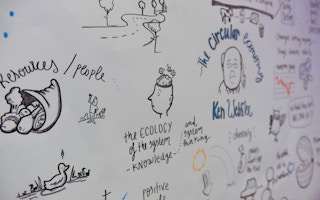Ideas on how companies and industries can produce more with less, reduce energy consumption and reuse waste - in other words, become more “circular” - are taking centrestage in a new competition to be held in Singapore.
The inaugural Circular Economy Challenge, hosted by Ricoh Asia Pacific and Eco-Business, aims to gather fresh and workable solutions that will transform Singapore’s economy into a more circular one.
The competition is part of Ricoh Asia Pacific’s annual Eco Action Day event, which is held in commemoration of World Environment Day every year.
It drums up awareness on environmental issues and encourages companies and individuals to pledge actions that contribute to protecting the Earth.
This year’s Eco Action Day focuses on the concept of a circular economy, which is by definition “restorative and regenerative by design, and aims to keep products, components and materials at their highest utility and value at all times”, according to the Ellen MacArthur Foundation.
At present, systems of production rely on extracting and using large amounts of cheap resources and energy for economic production, generating daunting volumes of polluting trash and wasting materials that could have been reused.
With the world’s population forecasted to grow in the century ahead, current levels of consumption will put a bigger strain on resources.
By United Nations estimates, there will be 8.5 billion mouths to feed by 2030 and 9.7 billion backs to clothe by 2050, and sustaining close to 10 million people leading similar lifestyles to the ones we do now will require three Earths’ worth of resources.
But there is growing awareness in the private sector of the need for more sustainable modes of production, and the circular economy is widely regarded as an important way to shift the destructive trajectory of the “make-use-dispose” model today to one that requires less new natural resources and energy.
Leading the way are multinational companies such as Unilever, which has pledged that all its plastic packaging will be 100 per cent reusable, recyclable and compostable by 2025.
The Circular Economy Challenge is asking tertiary students and young professionals from ages 17 to 30 to come up with similar proposals for companies or sectors.
Ricoh Asia Pacific’s general manager, JD Kasamoto, commented: “The traditional linear model of ‘make-use-dispose’ is no longer viable.”
“Ricoh recognises the need to embrace a circular economy, to reduce waste and encourage reuse of resources. With this Challenge, we seek to push the boundaries of conventional thinking about the production of goods and inculcate green values in youths.”
Participants should register their interest in groups of four and submit their final proposals by May 10. Five teams with the best proposals will be shortlisted to present their solutions to an expert panel of judges, who will decide on the winning team.
Up for grabs in the Circular Economy Challenge is a fully sponsored trip to Japan, including a tour to Ricoh’s newly opened Eco Business Development Centre, while runners up will receive cameras, travel vouchers, and a certificate of participation.
The winners will also get to participate in the Eco Action Day Circular Economy Industry Roundtable on June 1, where senior level executives from various sectors will come together to discuss how circular economy principles can be implemented in Singapore.
Jessica Cheam, managing editor of Eco-Business, said: “We wanted to raise the impact of the Eco Action Day campaign as it enters its second decade, and this challenge is a perfect way of engaging the youth to think deeply about radical solutions that can improve Singapore’s sustainability.
“The circular economy is now climbing the agenda for many governments and businesses worldwide. It is timely for Singapore to seriously consider how circular economy principles can help it attain its climate pledge and improve efficiencies and the sustainability of its economy,” she added.
Moving towards a more circular economy will also bring the economy in alignment with the UN’s Sustainable Development Goals (SDGs), specifically SDG 12: Responsible consumption and production, that seek to eradicate poverty, protect the environment and ensure good standards of living for all by 2030.
A report by the Ellen MacArthur Foundation, Towards a Circular Economy: Business Rationale for an Accelerated Transition, noted that the economy is currently locked in a linear model of production but given the trends of today – risks in supply of materials, increasing urbanisation, and advances in technology, to name a few - time is ripe for a transition to a circular economy.
“Circularity has started to make inroads into the linear economy and has moved beyond the proof of concept; the challenge we face now is to mainstream the circular economy, and bring it to scale,” it said.

















